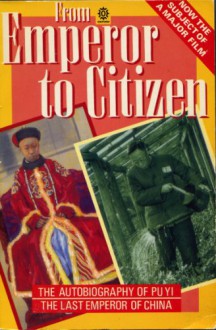From Emperor to Citizen: The Autobiography of Aisin-Gioro Pu Yi (Oxford Paperbacks)
First published in Chinese in 1964 and then banned by the revolutionaries ten years later, this remarkable autobiography presents the story of a man who served twice as emperor of China, once as emperor of the Japanese puppet state in Manchuria, and then underwent a complete re-education in the...
show more
First published in Chinese in 1964 and then banned by the revolutionaries ten years later, this remarkable autobiography presents the story of a man who served twice as emperor of China, once as emperor of the Japanese puppet state in Manchuria, and then underwent a complete re-education in the prisons of the Communist Chinese government, finally leading a life as an ordinary citizen. Placed on the throne in 1908 at the age of two, Aisin-Gioro Pu Yi became the tenth ruler of the Ch'ing Dynasty and the last emperor of China. Forced to abdicate four years later but permitted to remain in the Forbidden City until the Ch'ing court lost power in 1924, Pu Yi spent his youth surrounded by eunuchs, princes, cooks, consorts, tutors, and the decadent, often wild excesses of the Imperial Palace. During this time, Reginald Johnston, a Scottish district officer and magistrate of the British-leased territory of Weihaiwei in Shantung, became Pu Yi's tutor and established a bond with the young emperor that both remembered fondly in their writings. Recounting those early days, Pu Yi then describes his installation by the Japanese as puppet emperor in Manchuria, the defeat of Japan by the Allies in World War II, his imprisonment in the Soviet Union, and his eventual forced return to the People's Republic of China in 1950. Re-educated in Chinese prisons, Pu Yi learned how to dress himself, work on an assembly line, and criticize his former uselessness and pride. Pu Yi ends the account with his release from prison--pardoned by the Communist Party--and the beginning of his new life as a gardener and then as a researcher of literary and historical materials. This fascinating account not only depicts an empire in the throes of death and the zeal of a new-born regime, but also reveals the tragic story of a man who was a helpless subject of family and government turmoils and not really a ruler at all. W.J. Jenner has written a general introduction and individual introductions to each chapter, giving the history of the book and its political background. Simon Winchester has contributed an afterword on Chinese reactions to the empire and to the making of Bernardo Bertolucci's film about Pu Yi, due to release in November.
show less

